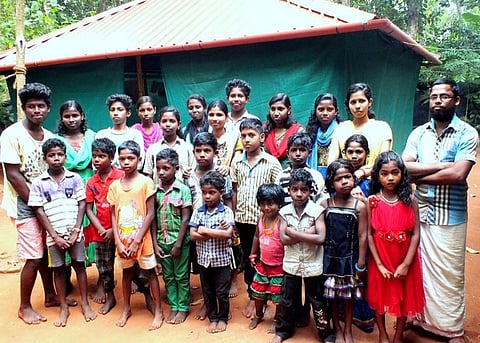

Twenty kilometres away from Thiruvananthapuram city is a small village called Chavady. In the village is an ‘SC/ST Colony’, which has about 80 families who belong to the Vedar community.
In this colony, you can find a small shed covered in green sheets, right outside a rather small hut.
On the four walls of this shed are self introduction write-ups by different students, in English and in Malayalam. There is a small shelf of books, and a bunch of floor mats in a corner.Welcome to Gothrathalam, an alternative school that is doing wonders for the confidence levels and the lives of Dalit and Adivasi students in the area.
Building a safe space
A few weeks ago, this reporter met a young student who studies at a government school in Kerala, and who had a confession to make.
“I study in Class 11. In my class, there is one girl who belongs to an SC community, and one girl who belongs to the ST community. They have been studying with us since CLass 1, but they have no friends in class. Nobody even speaks to them. Even the teachers don’t care for their existence. While many people in our class have got severe diseases, it’s these girls’ skin problems that worries the class. They don’t look at anyone, they don’t try to make friends, because they know that when they are not around, we whisper amongst ourselves about how they belong to the SC/ST colony,” the student revealed.
This confession reminded this reporter of an incident from her own school life. A classmate, who belonged to a Dalit community, refused to accept a cycle offered to him by the government while he was in school. He refused, because he did not want anyone to know his caste.
But he was forced to accept the cycle, after a few teachers intervened. And then, the taunting started. Someone yelled loudly about how ‘lucky’ he was to get a cycle. As the other students started laughing, his head was bowed in embarrassment.
Anyone who has ever studied in a government school can recall a few such faces, whom we ostracised because they belonged to a Dalit or Adivasi community.
Teachers always complained about them, claiming they didn’t even know how to write their names, that they wouldn’t speak up in groups, and that they would write nothing in exams. All these factors remain excuses to ostracise them, even today, and remains a big reason for the large number of school dropouts from Dalit and Adivasi communities.
So what is the solution? This is the question that led Mini Raman and her husband Sudhi Nammayan to begin an alternative school in their colony - Gothrathalam. The couple started Gothrathalam in 2012, with an aim to develop the basic education level of the students in their colony.
The children’s stories
Inside the tiny shed that is Gothrathalam, the first write-up that catches your eye is that of Priya, a Class 11 student. “I like to see the rain,” Priya writes in her self introduction. “My place and nature is very beautiful, I like my place.”
“I am not beautiful,” the young girl declares. “My school teachers are very cruel. But Gothrathalam teachers are good,” she writes.
Each write-up on the walls of the room have a story to tell, about what these children face outside their colony, and about the dreams they have for their own futures.
Language, the biggest issue
Sitting inside Gothrathalam, Sudhi says that none of these children were able to even write their names when they first entered the school.
“Many of the tribal as well as Dalit students can’t write or read, even after going to school for many years. Even a 15-year-old found it difficult to write. It’s a problem that the entire caste faces; it’s because they speak a different language. Here in the colony, we speak a language different from Malayalam. The tribal gothras of Wayanad, Palakkad etc have their own languages. So when these children go to school, and the classes are conducted in Malayalam, how will they learn? They are behind in their studies because they can’t follow what the teachers are saying.” Sudhi explains.
Sudhi adds that when the teachers realise that a student belongs to a Dalit or Adivasi community, their attitude suddenly changes.
“These teachers know that the students come from colonies. Their casteist attitudes are painful,” he says.
Gothrathalam’s many opportunities
Mini is from Wayanad and belongs to the Paniya tribe. “I was a school dropout, and later, I joined Kanavu, the alternate school founded by KJ Baby, and learned many things. Kanavu was my inspiration to start Gothrathalam,” Mini, who is a dancer, martial arts expert and the English teacher at Gothrathalam says.
The students who come to Gothrathalam learn the basics of both Malayalam and English. They are also taught to dream and to explore a world outside their colony.
Edited by Ragamalika Karthikeyan